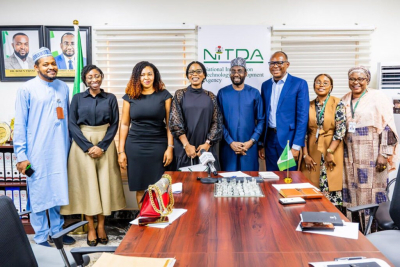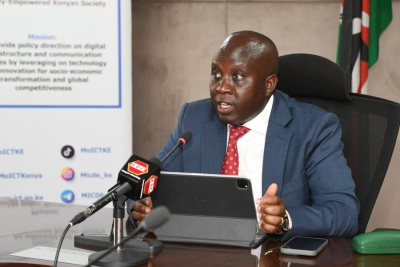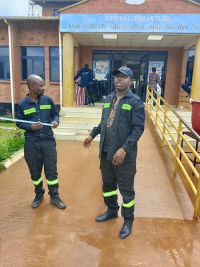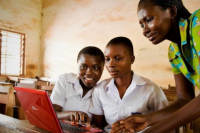Developed by a trio of tech entrepreneurs, the digital platform aims to streamline CV and cover letter creation, along with interview preparation.
TuConnect, a digital solution developed by a Kenyan startup of the same name, offers professional tools and career advice tailored to the African job market, supporting job seekers across the continent. Founded in Nairobi in 2024 by Geoffrey Amadi, Collins Oduor, and Edgar Omondi, the startup aims to address the region's unique employment challenges.
TuConnect provides a CV and cover letter generator that produces documents compatible with applicant tracking systems (ATS), increasing the likelihood of passing initial selection stages. An AI-powered live interview simulator allows users to practice for job interviews and receive immediate feedback, improving their performance.
The platform also delivers personalized career advice and tailored recommendations, developed in collaboration with industry experts, to guide users through their professional development. "Our solution not only builds ATS-friendly resumes and tailored cover letters, but also provides live interview simulations and personalised career guidance specifically designed to meet the unique challenges of the African job market," said Geoffrey Amadi.
Currently, TuConnect operates without a mobile application. Users access the platform by visiting the website and clicking the "Start for free" button to log in or create an account. The startup employs a freemium model, offering free CV creation, with premium features such as advanced customizations and AI-powered content recommendations available through a subscription.
TuConnect plans to expand its services to other East African markets, and subsequently, across the continent, to support a wider range of job seekers.
By Adoni Conrad Quenum,
Editing by Feriol Bewa
Developed by Samuel Njuguna, the app aims to reshape Rwanda's savings culture, leveraging sophisticated technology to simplify and automate savings.
Tunzi, a fintech solution developed by Moneto Ventures Limited, enables users to save funds during money transfers and everyday purchases. Launched in March 2025, the startup is led by Samuel Njuguna.
"Our platform's technology-driven approach eliminates the gap between the decision to save and the actual act," Njuguna said. "Tunzi allows users to save when they send or receive money, or make purchases, automating and simplifying the process."
The solution offers a mobile application available on both iOS and Android platforms. According to Play Store data, the Android version has achieved over one hundred downloads. Users can initiate savings with a minimum of 50 Rwandan francs, approximately $0.035, and without a maximum limit, making the app accessible to a broad demographic, including young people and self-employed individuals.
Tunzi incorporates automated savings options based on user spending patterns. For example, the app can be configured to prompt savings whenever a user makes a purchase or receives funds, effectively removing traditional barriers to saving and fostering sound financial habits.
The platform also provides features designed to encourage consistent and disciplined saving. Users can set personalized savings goals, monitor their progress in real time, and receive reminders for deposits. Additionally, Tunzi facilitates the creation of savings groups, allowing friends, family, or colleagues to collaborate on shared financial objectives.
In partnership with BK Capital, a fund manager licensed and regulated by Rwanda's Capital Market Authority (CMA), the startup ensures secure and professional fund management. Tunzi is also authorized by the CMA, guaranteeing adherence to local financial regulations.
By Adoni Conrad Quenum,
Editing by Feriol Bewa
- Google integrates short-term precipitation forecasts for all of Africa into its search engine
- Forecasts use Google Research’s MetNet AI model, updated every 15 minutes, covering 12-hour periods at 5-km resolution
- System combines satellite and limited ground data, addressing Africa’s sparse weather radar coverage (approx. 40 stations vs. 300+ in North America)
Google recently announced the integration of new short-term precipitation forecasts for the entire African continent into its search engine. This initiative aims to improve access to accurate, near-instant weather information, particularly in areas with limited monitoring infrastructure.
The forecasts, enabled by advances in Google Research's MetNet nowcasting model, combine satellite data with ground-based observations to deliver precipitation forecasts at a 5-kilometer resolution, updated every 15 minutes for the next 12 hours, according to a Google press release. The direct integration into Google Search results allows African users to easily access real-time information.
The deployment comes as Africa remains one of the least-covered continents by weather radar, with approximately 40 radar stations compared to nearly 300 in North America. This infrastructure gap renders traditional forecasting models less reliable on the continent. MetNet, an artificial intelligence-based system, provides accurate forecasts without the need for ground-based radar. The project was partially developed by Google Research Africa, with input from local experts in Accra and Nairobi, to tailor it to on-the-ground conditions.
For smallholder farmers, this innovation represents a significant advancement. Agriculture, a cornerstone of African economies, employs about 60% of the labor force and contributes between 30% and 60% of GDP in some countries. Smallholders, who account for nearly 60% of farms in sub-Saharan Africa, are especially vulnerable to weather-related risks.
With more accurate weather forecasts, these farmers can better plan planting, harvesting, and other agricultural activities, mitigating climate risks and improving yields. The technology will also strengthen the resilience of rural communities to climate change impacts by providing tools to adapt to shifting weather patterns.
By Samira Njoya,
Editing by Sèna D. B. de Sodji
Despite Nigeria’s thriving tech scene, many skilled professionals struggle to secure jobs. The partnership aims to bridge this gap by connecting rigorously vetted Nigerian tech talents with global opportunities through Doballi’s AI-enabled remote work platform.
The National Information Technology Development Agency (NITDA) has signed a Memorandum of Understanding (MoU) with Afrovision Technologies Limited (Doballi) to create sustainable employment opportunities for Nigerian tech talents.
Doballi’s Country Director, Mrs. Nneoma Ijei, expressed confidence that the collaboration would drive economic advancement and professional growth. She highlighted Nigeria’s potential to lead Africa in the global tech industry, with Doballi positioned at the forefront of this transformation.
Under the agreement, NITDA will provide a steady pipeline of trained tech professionals, ensuring they meet employable standards before onboarding them onto the Doballi platform. Doballi, in turn, will connect these talents with international enterprises, facilitate cross-cultural training, and waive the usual $150 assessment fee for Nigerian applicants.
Additionally, a dedicated dashboard will be created for NITDA to monitor talents’ progress, employer feedback, and foreign currency-based payments into the Nigerian banking system.
NITDA’s Director-General, Kashifu Inuwa Abdullahi, emphasized that the initiative will not only enhance digital job opportunities but also provide valuable data for policymakers.
Nigeria possesses a large and rapidly expanding talent pool with the potential to propel technological progress and digital transformation. A 2022 report by NITDA and ccHub, titled IT Talent Gap Assessment in Nigeria, estimates that about one-third of the population aged 15 to 35 represents a growing group of tech-savvy individuals eager to embrace emerging innovations.
With a significant portion of the youth population being tech-savvy, there is enormous potential for innovation, entrepreneurship, and job creation in the digital economy. However, without adequate job opportunities, training, and infrastructure, this potential could be underutilized, leading to high unemployment and brain drain.
The partnership between NITDA and Doballi is particularly crucial in this context, as it seeks to connect these skilled individuals with global job opportunities, ensuring that Nigeria’s digital workforce is fully integrated into the international tech economy.
By facilitating access to international job markets, the partnership has the potential to significantly reduce unemployment among tech professionals, contribute to economic growth, and position Nigeria as a leading exporter of tech talent on the global stage.
Hikmatu Bilali
- Kaspersky report warns of rising online risks tied to social validation
- The report highlights tension between digital validation and authentic connections
Social media, while a vital digital exchange space, exposes users to significant risks, a Kaspersky research recently released found. The research reveals a drive for online validation leaves many vulnerable to harassment, scams, and manipulation.
Nearly 45% of millennials, those born between the early 1980s and mid-1990s, report sharing major life events – promotions, moves, breakups – online before informing close friends or family, according to Kaspersky.
Despite this digital reliance, 55% of respondents believe in-person relationships remain more authentic, the study said. This heavy digital exposure carries consequences. More than 70% of millennials do not consistently verify the identity of their online contacts, and 64% have interacted with malicious individuals. Furthermore, 14% admit to using false names or profiles, indicating a normalization of online anonymity.
Accordion to Ruth Guest, a digital behavior specialist, there's a deep need for social validation among this generation, which grew up with digital technology. However, the pursuit of online recognition can distort perceptions. When a carefully crafted post generates a surge of positive reactions, it becomes tempting to prioritize this instant gratification over genuine, meaningful exchanges.
The study indicates these trends are amplified in Africa, where social media adoption is surging, driven by smartphone proliferation, improved internet connectivity, and a growing youth demographic. A 2024 study by Meltwater and We Are Social reported Africa had nearly 276.2 million social media users.
Kaspersky’s report arrives amid a sharp rise in African cyberthreats. INTERPOL cites online scams, identity theft, and social engineering as major concerns. Cybercriminals exploit personal social media information to enhance social engineering attacks and gain system access for ransomware deployment.
A lack of awareness and inadequate regulation in many African nations further exposes internet users to cybercriminal attacks, INTERPOL said. Social media is increasingly used for fraud, romance scams, and disinformation campaigns targeting vulnerable populations.
To mitigate social media risks, the report recommends verifying contact identities and avoiding friend requests or interactions without confirming authenticity. Protecting personal information involves limiting the sharing of sensitive data on public platforms. The use of strong, unique passwords for each account is also advised. Users should be wary of suspicious links and messages from strangers, which may be phishing attempts.
“The ease of online communication can lead to neglecting essential precautions. Verifying identities, limiting access to personal information, and learning to recognize warning signs are now crucial habits for safe internet navigation,” said Marc Rivero, a Kaspersky cybersecurity researcher.
By Samira Njoya,
Editing by Sèna D. B. de Sodji
The Ministry of Information, Communications, and the Digital Economy, in partnership with the Ministry of Interior and the Slovakian Government, has launched a 10-week Cybergame Challenge running until June 9, 2025.
Themed "Unlocking Your Cyber Security Potential," the competition aims to identify and nurture cybersecurity talent. Entry is free, with weekly challenges in different categories. Kenyan citizens qualify for prizes, while non-citizens can participate as non-competing players.
Winners will receive tech gadgets, cybersecurity training vouchers, software licenses, and tech store gift vouchers. Top performers may join Kenya’s National Cyber Security Team for regional and global competitions.
The SMART Zambia Muchinga Province team has deployed six internet access points at the Nakonde border post to enhance Zambia Revenue Authority (ZRA) operations, improving cargo clearance and efficiency.
The upgrade, announced March 31, will speed up cargo processing by strengthening connectivity. The project was implemented in collaboration with ZRA Nakonde ICT Officer Dennis Machaya.
The initiative supports the government's goal of leveraging technology to enhance trade and regional economic integration.
- Senegal launches "Tabax Sénégal" digital platform to boost employment and investment
- Platform matches users with job opportunities, funding sources, and strategic partnerships
- Features include personalized profiles, CV database, and project tracking tools to enhance transparency, skills certification, and streamlined recruitment processes
Senegalese President Bassirou Diomaye Faye on Tuesday launched "Tabax Sénégal," a digital platform designed to connect job seekers, entrepreneurs, and investors, addressing the country's employment, entrepreneurship, and project financing challenges.
The platform matches job seekers with relevant professional opportunities, supports project developers by facilitating access to funding and strategic partnerships, and showcases high-growth-potential initiatives to investors, aiming to stimulate Senegal's economic development.
Tabax Sénégal offers personalized user profiles, simplified stakeholder matching, business opportunities, interactive project and application tracking, and skills certification. The platform allows Senegalese citizens to upload their resumes to a database of job offers and applications, ensuring fairness and transparency.
The initiative is part of the National Strategy for Employment, Entrepreneurship, and Investment, and comes as Senegal faces a slight increase in unemployment. Data from the National Agency for Statistics and Demography (ANSD) shows the country's unemployment rate reached 20.3% in the third quarter of 2024, up from 19.5% in the same period in 2023, an increase of 0.8 percentage points.
With 200,000 to 300,000 young people entering the job market annually, securing stable employment is a critical issue. The digitization of employment services is expected to streamline recruitment and improve the match between labor supply and demand. The platform also aims to mobilize local and international financing to support entrepreneurship.
By Samira Njoya,
Editing by Sèna D. B. de Sodji
- Uganda proposes three-year income tax exemption for startups
- Measure part of 2025 Income Tax Bill aims to boost entrepreneurship and innovation
- Builds on past state initiatives like the National ICT Support Program and Innovation Hub
Ugandan startups may soon receive a three-year income tax exemption aimed at accelerating the nation's startup ecosystem. The measure, part of proposed amendments to the 2025 Income Tax Bill announced last week, seeks to spur entrepreneurship, support small and medium-sized enterprises, and bolster innovation.
The government has previously launched initiatives to support startups, including the National ICT Initiatives Support Program, which helps Ugandan ICT innovators overcome hurdles to entering local and international markets. Additionally, the state established the National ICT Innovation Hub, providing stable internet connectivity and dedicated workspace for tech entrepreneurs.
Private sector efforts, including those by telecom operators and accelerators like Stanbic Business Incubator, Innovation Village, Hive Collab, and Outbox Hub, also contribute to the country’s entrepreneurial growth.
Uganda currently ranks third in East Africa and 95th globally, according to StartupBlink's 2024 "Global Startup Ecosystem Index." Kampala, the capital, holds the 368th position out of 1,000 cities worldwide, and is home to startups such as Tugende, SafeBoda, Numida, and Rocket Health.
StartupBlink, however, recommends diversifying Uganda’s startup ecosystem, which it deems too Kampala-centric. Developing regional hubs would accelerate sector growth, the organization said. It also stressed the need for stronger collaboration among stakeholders to prevent fragmentation that could limit the country’s potential. Furthermore, it advocated for a robust regulatory framework and incentives to attract more investment and stimulate startup growth. National ecosystem investment totaled $10.6 million in 2023, a 60.4% drop from the $26.8 million recorded in 2022.
By Isaac K. Kassouwi,
Editing by Sèna D. B. de Sodji
- GSMA proposes lowering Internet quality standards to boost access in Sub-Saharan Africa
- GSMA argues strict speed and reliability rules deter rural investment
- Critics warn reduced quality may harm businesses and user experience amid rising digital demands
- Observers call for more public investment and improved tax policies to support telecom growth
The Global System for Mobile Communications (GSMA) proposes a controversial strategy to accelerate internet access in Sub-Saharan Africa, where penetration remains the world's lowest at roughly 40% of the population: relax quality of service (QoS) requirements.
In its report, "Advancing the Digital Transformation of African Economies. Analytical and Methodological Paper," the GSMA argues that stringent standards for network speed and reliability impede investment, particularly in rural and peri-urban areas.
The organization's analysis indicates that doubling speed requirements would escalate infrastructure investment costs by 20% to 50%. Similarly, reducing 4G reliability standards, for instance, from 95% to 50% during peak hours, could slash the cost of achieving universal broadband in Sub-Saharan Africa by 30%. Citing the International Monetary Fund, the GSMA suggests this would lower the total investment from $91 billion to $64 billion.
The GSMA contends that easing standards would make investments more viable, while benefiting consumers through reduced prices. The report projects that a less demanding approach to QoS could decrease mobile data prices by 33% by 2028 and increase internet users by 23% compared to current projections.
This strategy, the GSMA asserts, would also enable operators to more effectively deploy 5G, expand 4G coverage, and maintain 3G in less connected regions. The organization emphasizes that aligning with less rigid international standards could stimulate demand and attract greater investor interest.
However, the proposal faces opposition. Some experts express concern that diminished service quality could negatively impact users, especially businesses reliant on stable connections. With the growth of bandwidth-intensive services like video streaming, gaming, and cloud computing, reliable internet access is crucial for optimal user experience.
Other industry observers highlight the urgent need for increased public investment in high-speed telecom network deployment, now considered essential for security, economic, and social development. They also advocate for improved tax policies to incentivize telecom operator investment.
In 2019, the International Telecommunication Union (ITU) asserted that a 10% increase in mobile internet penetration in Africa would boost GDP per capita by 2.5%.
Muriel EDJO
More...
Katsina State, Nigeria, is set to host Arewa Tech Fest 2025. The event will bring together industry leaders, startups, investors, and tech enthusiasts on May 21-22, 2025, at the Katsina Directorate of ICT Complex, KSITM.
Themed "Innovating for Impact: Technology as a Catalyst for Economic Transformation," the event will explore how technology drives economic growth and entrepreneurship in Northern Nigeria.
Attendees will connect with key industry players, explore investment opportunities, and engage in panel discussions, workshops, and product showcases. Topics will cover AI, fintech, and digital innovation.
- Congo has allocated 800 million CFA francs (approx. USD 1.3 million) to National Cybersecurity Agency (ANSSI)
- Budget will support infrastructure deployment, staff recruitment, and development of cybersecurity strategies
The Republic of Congo has allocated 800 million CFA francs (approximately $1.3 million) to fund the National Cybersecurity Agency's (ANSSI) operations as it seeks to enhance its digital defenses.
Minister of Posts, Telecommunications, and the Digital Economy, Léon Juste Ibombo, announced the budget during a meeting last week with ANSSI's Director General, Oboulhas Tsahat Conrad Onésime, who was appointed in February.
The allocated funds will enable ANSSI to develop its infrastructure, hire skilled personnel, and formulate targeted cybersecurity strategies, aiming to enhance the protection of information systems against escalating cyber threats and foster data security and trust within the nation's digital ecosystem.
ANSSI, operating under the authority of the Presidency and overseen by the Ministry of the Digital Economy, is tasked with supervising and coordinating national cybersecurity, managing digital threats and incidents, responding to cyberattacks, and safeguarding the country's digital infrastructure.
The agency confronts several challenges, including the need for cybersecurity expert training, public and institutional awareness campaigns on cybersecurity issues, and improved coordination among key stakeholders.
According to the 2024 International Telecommunication Union's Global Cybersecurity Index, the Republic of Congo is classified in Tier 4, scoring 27.61 out of 100, underscoring the substantial efforts required to strengthen its cybersecurity framework.
Adoni Conrad Quenum
- Ghana’s Communications Minister met Meta VP Kojo Boakye to discuss digital inclusion, innovation, and cybersecurity
- Talks highlighted potential collaboration leveraging Meta’s AI expertise and popular platforms in Ghana
- No formal agreement or project announced; discussions remain at an early stage
Ghana is exploring potential partnerships with U.S. tech giant Meta Platforms (Meta) to bolster its digital sector following discussions last week between Communications Minister Samuel Nartey George and Meta's Vice President for Public Policy in Africa, the Middle East, and Turkey, Kojo Boakye.
The talks centered on how Meta could support Ghana's digital growth, specifically in areas such as digital inclusion, innovation, and cybersecurity. "Given Meta’s expertise in artificial intelligence (AI) and modern technologies and the popularity of Meta’s Facebook, Instagram, and WhatsApp in Ghana, the Minister explored opportunities for cooperation in these fields, similar to Meta’s collaborations with other countries," the Ministry of Communication, Digital Technologies and Innovation said in a statement released Friday.
The Meta meeting coincided with discussions with Ecobank Ghana, focused on promoting digital inclusion, financial technology, and innovation, underscoring the government's emphasis on collaborative efforts.
March alone saw Minister George engage in digital cooperation talks with Germany, Italy, Turkey, Israel, fiber company CSquared, Deloitte, the Regional African Satellite Communications Organization (RASCOM), and UNESCO, among others.
Ghana scored 0.6316 out of 1 on the 2024 e-Government Development Index, ranking 108th globally out of 193 nations. While surpassing West African and African averages, Ghana remains below the global benchmark, indicating a need for enhanced development in human capital and online services, where it scored 0.5586 and 0.6084, respectively.
Despite the International Telecommunication Union (ITU) citing Ghana as a global cybersecurity model in its "Global Cybersecurity Index 2024," the nation recognizes the necessity for further progress, particularly in capacity development.
Meta has expressed openness to supporting Ghana's digital transformation goals. However, discussions remain preliminary, with no agreements signed or announced, and no specific projects yet defined.
By Isaac K. Kassouwi,
Editing by Sèna D. B. de Sodji
With the rapid global shift toward the digital economy, equipping young people with digital and business skills is essential for fostering innovation, entrepreneurship, and economic growth.
Zambia has launched an Online Entrepreneurship Learning Program to foster digital innovation and entrepreneurship. The initiative, launched on March 31, was unveiled by Hon. Felix Mutati, Minister of Technology and Science, alongside Mr. Ville Tavio, Finland’s Minister for Foreign Trade and Development. It aims to equip young Zambians with critical digital and business skills.
During the launch event, the Zambia Information and Communications Technology Authority’s (ZICTA) Director General, Eng. Collins Mbulo highlighted how the initiative aligns with ZICTA’s mission to build an inclusive digital society.
The program is implemented by Nokia in partnership with Airtel Networks Zambia PLC. It is designed to empower aspiring entrepreneurs by leveraging technology for business growth and job creation.
Youth unemployment remains a significant challenge in Zambia. Data from the Zambia Statistics Agency shows that in 2023, the youth unemployment rate was 12%, leaving many young people struggling to find formal jobs. This underscores the importance of entrepreneurial skills, enabling young individuals to create their own employment opportunities rather than depending solely on traditional job markets.
By providing access to essential digital skills, the Online Entrepreneurship Learning Program is expected to drive economic growth, foster innovation, and create opportunities for Zambia’s youth in the evolving digital economy.
Hikmatu Bilali















